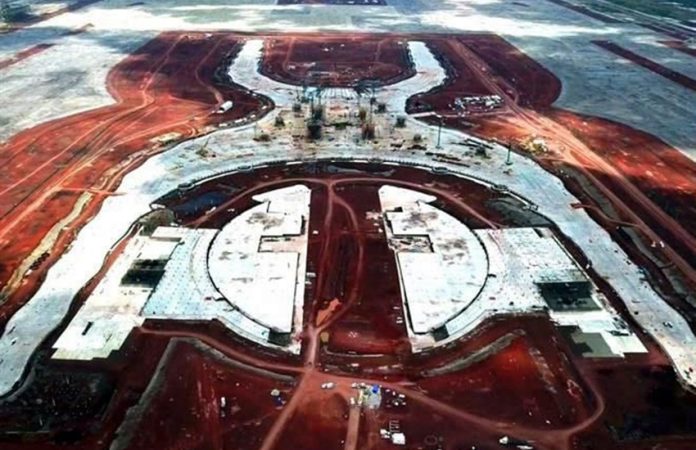It was canceled in 2018 but that didn’t stop the previous government’s Mexico City airport project from winning a 2021 international architecture award.
The project, which was canceled by President López Obrador after a legally questionable public consultation, won the first prize in the transportation (concept) category of the Rethinking the Future Awards 2021, an annual awards program now in its ninth year.
Announcing the scrapped airport’s victory, Rethinking the Future, an architecture website that organizes the awards, said architects Fernando Romero and Norman Forster had sought to “revolutionize airport design and the experience of traveling.”
“… The intense colors, characteristic of Mexican culture, bleed into the functional components of the intelligent membrane skin/building facade. The Mesoamerican symbol of the sun is evoked within the central luminous vaulted hall,” the website said, referring to a terminal that was never built.
“From the initial view from the sky and the car to the awe-inspiring moment of making it inside, the architecture binds body and spirit, Mexico City and travel, technology and history, into a unified lightweight structure that evokes the excitement of traveling.”
Apparently oblivious to the project’s cancellation, Rethinking the Future said the airport, which was being built on an ancient lakebed in Texcoco, México state, was “a necessary and important investment for the country’s future” and represented a “coming together of global design talent and local innovation [that] will allow for great spans and soaring heights, at one-third of the mass and three times the span of a typical airport.”
The apparent positive attributes of the airport design failed to impress López Obrador who, before coming to office in late 2018, argued that the project was a boondoggle – corrupt, too expensive and being built on land that is sinking.
He revisited his decision to cancel the US $15-billion project on Friday, asserting that it was a wise one.
“The best public business we’ve done has been not to build the Texcoco airport, estimated at 300 billion pesos,” López Obrador told reporters at his regular news conference.
He said the cancellation will cost 100 billion pesos and that building his government’s Mexico City airport at the Santa Lucía Air Force base north of the capital will cost 75 billion pesos.
Therefore, the decision to cancel the Texcoco project generated savings of 125 billion pesos (US $6.2 billion), López Obrador said. The abandoned airport site is to be converted into a massive ecological park at an estimated cost of almost 18 billion pesos.
The president said the 125-billion-peso saving is almost equivalent to the cost of the US $8-billion Maya Train, a railroad that will run through five states in southeastern Mexico.
Canceling the project, a move opposed by the president’s former chief of staff Alfonso Romo and ex-finance minister Carlos Urzúa, was the “best public business” decision the government ever made, López Obrador reiterated.
Source: Reforma (sp)
